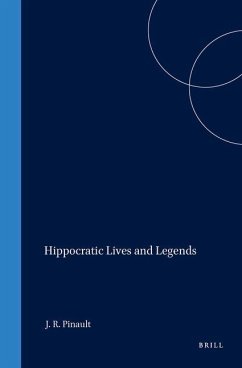"Hippocratic Lives and Legends examines the ideal of the ancient physician and processes of biographical fiction that shaped the legend of Hippocrates. Focusing on three stories in particular -- how Hippocrates cured the plague, Hippocrates' detection of King Perdiccas' lovesickness, and Hippocrates' refusal to serve Artaxerxes, King of Persia -- J.R. Pinault traces the development of these legends from their Hellenistic origins to the end of antiquity and into the Islamic world. In addition, "Hippocrates Lives and Legends will prove a useful reference work. J.R. Pinault brings together in a convenient format the classical biographies of Hippocrates and the principal Arabic lives, translated here for the first time. Each text is discussed in detail, and the Greek and Latin texts of the classical lives are made available in the appendices.
Bitte wählen Sie Ihr Anliegen aus.
Rechnungen
Retourenschein anfordern
Bestellstatus
Storno

